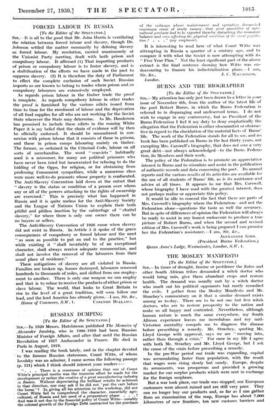FORCED LABOUR IN RUSSIA [To the Editor of the SPECTATOR.]
is all to the good that Mr. John Harris is ventilating the relation between forced labour and slavery, though Dr. Johnson settled the matter summarily by defining slavery as forced labour. My resolution, carried unanimously at the Unionist Party meeting, dealt with both prison and compulsory labour. It affirmed (1) That importing products of prison or compulsory labour is to foster slavery, and is a stultification of the efforts we have made in the past to suppress slavery. (2) It is therefore the duty of Parliament to effect the complete exclusion of such Soviet Russian imports as are known to belong to trades where prison and /or compulsory labourers are extensively employed.
As regards prison labour in the timber trade the proof is complete. As regards compulsory labour in other trades the proof is furnished by the various edicts issued from time to time for the enrolment of labour and the deprivation of all food supplies for all who are not working for the Soviet State wherever the State may determine. As Mr. Henderson has promised to include these edicts in the coming White Paper it is my belief that the chain of evidence will by then be officially endorsed. It should be remembered in con- nexion with prison labour that it consists of those in prisons, and those in prison camps labouring mainly on timber. The former, as ordained in the Criminal Code, labour on all sorts of merchandise. The word " convicts " habitually used is a misnomer, for many are political prisoners who have never been tried but incarcerated for refusing to do the bidding of the Ogpu, for religion, or for abstaining from professing Communist sympathies, while a numerous class were more well-to-do peasants whose property is confiscated. The Anti-Slavery Convention laid down at the outset that " slavery is the status or condition of a person over whom any or all of the powers attaching to the rights of ownership are exercised:' This is precisely what has happened in Russia and it is quite useless for the Anti-Slavery Society and the League of Nations Union to explain' their both pitiful and pitiless inaction by the subterfuge of " chattel slavery," for where there is only one owner there can be no buyers or sellers.
The Anti-Slavery Convention of 1926 came when slavery did not exist in Russia. In Article 5 it spoke of the grave consequences of compulsory or forced labour and the need " as soon as possible to put an end to the practice," but while existing it "shall invariably be of an exceptional character, shall always receive adequate remuneration, and shall not involve the removal of the labourers from their usual place of residence."
These mitigations of slavery are all violated in Russia. Families are broken up, homes destroyed, labourers removed hundreds to thousands of miles, and shifted from one employ. ment to another. There is only one weapon we can employ and that is to refuse to receive the products of either prison or slave labour. - The world, that looks to Great Britain to rise to the level of a great tradition, will soon follow our lead, and the lead America has already given.I am, Sir, &c.,


































 Previous page
Previous page